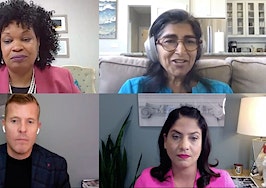When pandemic-induced lockdowns struck nationwide in March and April, multiple listing services had to decide whether to pause displays of days on market or leave the metric as is.
Only two of 30 MLSs who responded to Inman’s inquiries chose to outright pause days on market for Active listings, though about half chose to adjust the rules for listings in other statuses that do not accrue days on market and which proved to be more popular during the early days of shelter-in-place orders. Now that lockdown restrictions have eased in many places nationwide, many, though not all, of those rule changes have gone back to their pre-pandemic normal. The 30 MLSs represent nearly 900,000 agent, broker and appraiser subscribers nationwide.
Both of the MLSs that paused days on market accrual were in California and each has about 16,000 subscribers. Silicon Valley-based MLSListings paused days on market for about 60 days from mid-March to mid-May. The MLS rolled back the change when government rules began allowing showings of occupied homes. MLSListings CEO Dave Wetzel told Inman that whether to unwind rule changes was an “ongoing dialogue” for the MLS’s board of directors.

Dave Wetzel
“With infection rates as high as they are plus with state and county rules changing over time, it is something the board constantly discusses and reviews to be sure we’re providing the services and policies that our local brokers and agents need,” he said via email.

Annie Ives
Los Angeles-based The MLS/CLAW suspended counting days on market on March 15 and lifted the freeze on July 1 after the state’s stay-at-home order began to ease, according to The MLS CEO Annie Ives. Also on July 1, The MLS rolled back a rule that had allowed agents to use the Coming Soon status for the entire duration of a listing contract; that rule has reverted back to allowing that status for up to 21 days.
Two rule changes remain in effect: Listings can stay in Hold status for up to 30 days (up from 10 days) and agents can use the Hold status up to two times but cannot exceed the duration of the listing agreement. The MLS’s open house features also remain disabled and The MLS has instead implemented Virtual Showings via a video URL, Facebook, Twitter, Instagram, or YouTube, Ives told Inman via email. “We stress the fact that there are no open houses, only Virtual Showings or By Appointment Only,” she said.
Changes to Hold and Temp Off Market statuses

Art Carter
Nearby California Regional MLS (CRMLS), the largest MLS in the country at more than 101,000 subscribers, also continues to have its broker tour and open house features disabled because of recommendations from the California Association of Realtors, the California Department of Real Estate and the Centers for Disease Control, CRMLS CEO Art Carter told Inman via email. “[We] want our users to remain compliant and safe,” he said.
CRMLS opted to continue letting days on market accrue for Active listings, but to change its policies regarding listings in Hold status, which do not accrue DOM. CRMLS’s definition for Hold status encompasses listings for which a valid listing contract exists and no offer has been accepted but which the seller has instructed be listed as “Hold,” which means the listing cannot be shown or sent to third-party portals.
CRMLS changed its rules to allow a listing to remain in Hold status indefinitely rather than for a maximum of 30 days. That change remains in place. “We are trying to assist agents and brokers with continuing to do business during the pandemic,” Carter said.
The listing service has added dedicated fields for Virtual Open Houses and Virtual Showings, though it is no longer allowing links to unbranded virtual tours in the Public Remarks field as it did at the beginning of the pandemic. “[T]he change was made because the portals were no longer willing to allow agent display and began stripping those URLs out of the listing content,” Carter said.
Farther north, the San Francisco Association of Realtors, which has about 4,800 subscribers, is also not allowing broker tours and open houses due to county guidelines. SFAR is still allowing listing agents for listings placed on Hold status on or after March 9, 2020 to email SFAR a request to have that listing marked as “New” once the listing has been changed back to any Active status — a change the association’s MLS made back during the initial lockdowns.

Walter Baczkowski
But that option is being used less than it was in March and April as a new normal takes hold, according to SFAR CEO Walt Baczkowski.
“[I]n November of 2019 under normal market conditions, we would see about 80 listings in Hold status at any given time. In January the average Hold count was 45, totally normal for that period of the year. At the peak of COVID during March and April we saw 200 or more listing in a Hold status,” Baczkowski said via email.
“The current count today is back around 70 to 80, which is reasonably close to normal for this time of year in our market, particularly so given our current increased inventory. Our current on-market inventory has increased about 45 percent compared to this time last year, but it is unclear if the increase is entirely the result of COVID-19 market shifts, or something else. This normal-looking count for Hold listings points to a stabilization of the expectations and perceptions of agents, sellers and buyers.”
Bright MLS, the nation’s second-largest MLS with about 91,000 subscribers, made a change to a similar status: the Temporary Off-Market (Temp Off) status.
“We made this move to provide a ‘time out’ for listings during the slowdown earlier this spring. Specifically, our subscribers were able to switch the listing status to Temp Off and pause the DOM/CDOM [cumulative days on market],” Bright MLS spokesperson Chris Finnegan told Inman via email.
“There was no time limit for the expanded status and subscribers were permitted to continue marketing the property while in Temp Off. There also was no limit for switching back between Temp Off and Active.”
While agents embraced the expanded Temp Off status during the spring slowdown, because the market has heated up in recent months, use of the Temp Off status has waned, so the MLS will likely be returning the status to its original scope in the coming weeks or months, Finnegan added.

John Ryan
Georgia MLS, which has about 42,000 subscribers, changed a policy allowing agents to place listings in a temporary “Do Not Show” status (which does not accrue DOM) for up to 28 days, up from seven days, and that policy is still in place, according to CMO John Ryan. GAMLS never considered stopping DOM accrual, he told Inman via email.
“Days on Market is an indicator that allows us to properly evaluate the marketplace for both current and historical periods. Altering the way Days On Market data is calculated, due to black swan or economic events, would skew the analysis on the impact of such occurrences,” he said.

Jeremy Crawford
Neighboring First MLS added a new Hold Temp Off Market status option, which does not calculate DOM and does not distribute listings outside of the MLS, according to FMLS CEO Jeremy Crawford. It’s still available to FMLS’s some 46,000 subscribers.
“We haven’t had many listings use this status, less than a few hundred a week, but agents have commented that it’s exactly what they needed for the few sellers that wanted to park their listings while preparing to show during COVID-19,” Crawford told Inman via email.
“Most agents were able to leverage our new platforms for virtual showings with Remine, ShowingTime and Cloud CMA and satisfy their clients without having to take listings from active status. Atlanta continues to have a major inventory shortage, so most homes are selling very quickly in today’s market even with virtual showings and virtual open houses being used in place of onsite in many instances.”
MIAMI MLS, which has 49,000 subscribers, extended its Temporarily Off Market status longer than any of the other MLSs — from a max of 30 days pre-pandemic to a max of 90 days today. The MLS tracks the metric daily and plans to keep the extension in place for the foreseeable future.
For Chicago area-based MLS MRED, which has about 45,000 subscribers, the pandemic was a catalyst to implement a change to its Temp status faster.
“Previously, the time a property spent in Temp status would count toward Listing Market Time. Now, the time a property spends in Temp status will not count toward Listing Market Time,” MRED spokesperson Jon Broadbooks told Inman via email.
‘The time a property spends in Temp status will continue to count toward Total Market Time. This cumulative number is available to the agent only, and is not provided on public reports, which use Listing Market Time.
“Our concern, pandemic or not, was that we wanted to make sure the data accurately reflects what’s happening in the market. This change is still in place.”
MRED, like other MLSs, also added an MLS field for livestream open houses, at subscriber request. “This field will (hopefully) outlive the pandemic, as we know many agents are finding this an effective marketing tool,” Broadbooks said.
REColorado, which has about 25,000 subscribers, allowed agents to keep a listing Coming Soon for up to 14 days, up from a max of seven days, and that change is still in place.

Tim Dain
Two MLSs that changed their Coming Soon statuses due to the pandemic have changed them back: St. Louis, Missouri-based MARIS (14,080 subscribers) had allowed listings to be in Coming Soon status for up to 60 days but fully rolled back that change as of July 10.
“The why is market related,” MARIS CEO Tim Dain told Inman via email. “Missouri more fully opened its marketplace faster than many other states. Our brokers were asking us to return to something closer to normal, so we made the change back to 21 days.”

John Mosey
With more than 20,000 subscribers, St. Paul, Minnesota-based NorthstarMLS had the same Coming Soon rule change in place and subsequently rolled it back on July 30. NorthstarMLS had also allowed a listing that was unavailable for showings to remain in Active status if it was disclosed in the Remarks field that it was temporary and COVID-related, according to CEO John Mosey. That ended July 1.
NorthstarMLS discussed pausing days on market, but ultimately decided not to.
“[I]t was agreed that DOM was an important and accurate reflection of the market time for listings and that pandemic effects were real and universal,” Mosey said. “At the same time, after a very brief period of uncertainty, listings have been selling at last year’s rate or better. Last year was great.”
Where markets stayed hot, no changes

Matt Consalvo
Despite the pandemic, the Arizona real estate market never stopped and therefore Arizona Regional MLS did not make any changes to statuses or days on market, according to CEO Matt Consalvo,
“In fact demand is strong and year-over-year sales in July were higher,” he said.

Brad Bjelke
Similarly, UtahRealEstate.com, which covers the vast majority of the state and boasts approximately 17,100 subscribers, did not see any need to make changes to DOM or statuses.
“Our real estate market in Utah has been extremely hot and sales hit their highest numbers of all time in July,” CEO Brad Bjelke told Inman via email. “[W]e believe that keeping our rules in place helped keep the stability of the market intact.”
Alaska MLS (about 2,200 subscribers), Massachusetts-based MLS PIN (more than 42,500 subscribers), Louisiana-based Gulf South Real Estate Information Network (6,958 subscribers), New Jersey-based Monmouth MLS (about 13,000 subscribers), Virginia-based Real Estate Information Network (more than 7,800 subscribers), Oregon-based RMLS (14,200 subscribers), and Texas-based NTREIS (42,000 subscribers) also did not make any changes to rules or statuses.

Phil Tedesco
Rhode Island Association of Realtors State-Wide MLS (about 6,000 subscribers) didn’t changes its statuses or DOM accrual but temporarily changed what “available for showings” means to allow for virtual showings.
“Now that Rhode Island is in Phase 3, we’ve since peeled back that allowance,” CEO Phil Tedesco told Inman via email. “I believe many still may be doing virtual showings, but we’ve not had any issues. I think everyone is pretty understanding of the unprecedented circumstances we are in and, thankfully, common sense is prevailing.”
On that same vein, Indiana-based MIBOR (nearly 9,000 subscribers) temporarily suspended a requirement for Active listings to be shown but has since reinstated that rule. And Michigan-based Realcomp, which has about 16,000 subscribers, only allowed virtual showings until the state’s governor lifted a stay-at-home order on May 7.
Other MLSs made no status or DOM changes but opted to educate their subscribers in regards to days on market. For instance, until the market rebounded over the last several weeks, the Houston Association of Realtors (nearly 40,000 subscribers) displayed the following notice on all listings displayed on HAR.com: “Due to the current situation, the Days on HAR.com may not accurately reflect typical market conditions.”
“DOM is no longer being affected by COVID to the extent it was at the beginning of the pandemic and during stay-at-home orders. Therefore … the statement has been replaced with the following: ‘There is a heightened risk for COVID-19 in Texas. Please consider alternative methods, such as Virtual Open Houses and 3D Tours to show or view a property,'” a HAR spokesperson told Inman via email.
North Carolina-based Canopy MLS (about 17,000 subscribers) reminded agents that placing a listing in Temporarily Off Market status will make DOM stop, but if the property is being shown the agent must change the listing status back to Active “because you cannot misrepresent the availability of a property for showing.”

Dionna Hall
BeachesMLS in Florida (more than 35,000 subscribers) did not change DOM or any statuses as a result of the pandemic but has seen an increase in listings in Temp Off Market status and a decrease in days on market.
“Prior to the pandemic, BeachesMLS Temp Off Market (TOM) status was not limited by the number of days a listing could remain in TOM and this continues to be the case,” CEO Dionna Hall told Inman via email. “Since the pandemic began, we have seen a steady increase in TOM listing counts, with July increasing 18.6 percent over the previous month.”
“BeachesMLS Days on Market (DOM) have shifted during the pandemic,” she added, “with the most drastic change occurring in April when we saw a 13 percent decline throughout the area.”
In-person open houses return in some places

Merri Jo Cowen
New Mexico-based Southwest MLS (about 4,100 subscribers) temporarily stopped in-person open houses from March to early June. Hawaii-based HiCentral MLS (6,406 subscribers) disabled open house features for three months and restarted them on June 5, as soon as county orders allowed. Stellar MLS (nearly 60,000 subscribers) initially shut down face-to-face open house functionality, but reactivated open houses on May 22 after a meeting with the state Realtor association, the state surgeon general and brokers, according to Stellar MLS CEO Merri Jo Cowen.
“[R]eviewing best practices and getting feedback from the Surgeon General on what he thought was important, Florida Realtors then put together a comprehensive guide of do’s and don’ts for showings/open houses and received no objections from the state, so we moved forward to reactivate the functionality so our members could do in-person open houses or virtual open houses,” Cowen told Inman via email.
OneKey MLS declined to comment for this story. The Council of MLSs, Garden State MLS, Central Jersey MLS, Tulare County Association of Realtors, Triad MLS, Northern Nevada Regional MLS, New Jersey MLS, NEREN MLS, Las Vegas Realtors, High Desert MLS, Hawaii Information Service, Greater Northwest Indiana Association of Realtors, Greater El Paso Association of Realtors, Florida Gulf Coast MLS, and Austin Board of Realtors did not respond to requests for comment.
Email Andrea V. Brambila.
Like me on Facebook | Follow me on Twitter













